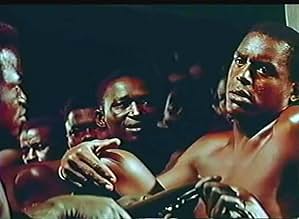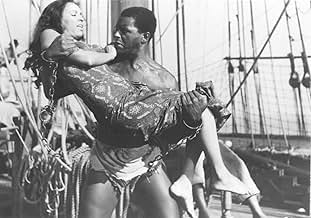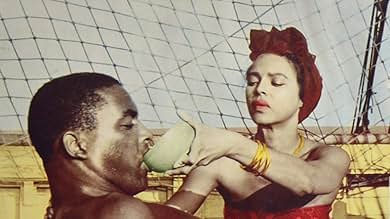Adicionar um enredo no seu idiomaA Dutch slave captain, on a voyage to Cuba, faces a revolt fomented by a newly captured African slave, Tamango. The slaves capture the captain's mistress, forcing a showdown.A Dutch slave captain, on a voyage to Cuba, faces a revolt fomented by a newly captured African slave, Tamango. The slaves capture the captain's mistress, forcing a showdown.A Dutch slave captain, on a voyage to Cuba, faces a revolt fomented by a newly captured African slave, Tamango. The slaves capture the captain's mistress, forcing a showdown.
- Direção
- Roteiristas
- Artistas
Avaliações em destaque
"Tamango" is a rousing and intelligent tale of a slave ship revolt in the 18th century. It strives to avoid transparent moralizing and overt stereotypes, particularly by placing the gorgeous Dorothy Dandridge in the pivotal role of the Captain's mistress. She must decide whether to send him to his certain demise among her fellow Africans (as Leonard Maltin avers, it's way ahead of its time). Perhaps this even-handedness is not all that surprising given the fact that it was directed by the blacklisted John Berry, who found refuge in France after helming several sensitive films noirs about the urban American underclass.
Most references give the film's literary source as a novella by French author Prosper Merimée. However, I recently stumbled upon an article in the "New York Times" (August 24, 2005) concerning a South African archaeologist who is combing a beach off Cape Horn for the wreck of a Dutch slave ship named the Meermin. The history given of this particular ship is pretty much a blow-by-blow description of this film (apart from the miscegenation), even down to the very details of how the slaves were given their chance, and how the surviving crew foiled them at one point. I can't remember if the film acknowledges any true-to-life origins, but this shivery narrative certainly lends the movie even more credence.
Most references give the film's literary source as a novella by French author Prosper Merimée. However, I recently stumbled upon an article in the "New York Times" (August 24, 2005) concerning a South African archaeologist who is combing a beach off Cape Horn for the wreck of a Dutch slave ship named the Meermin. The history given of this particular ship is pretty much a blow-by-blow description of this film (apart from the miscegenation), even down to the very details of how the slaves were given their chance, and how the surviving crew foiled them at one point. I can't remember if the film acknowledges any true-to-life origins, but this shivery narrative certainly lends the movie even more credence.
I was quite impressed with this film, mostly for the incredible strides forward it made in portraying the horrors of the slave trade and horrific abuse of the kidnapped and enslaved Africans. The epic miniseries Roots, two decades later, and Spielberg's Amistad some 40 years after this film offer more detail and arguably higher production values, but Tamango is well worth watching, especially for those keen on either film or world history. Like another reviewer, I found the acting a little flat, despite the presence of the talented Curd Jurgens and Dorothy Dandridge. But the performances of all were engaging enough for me to want to stick with it to see the resolution of the conflicts. I was also very impressed to see the relationship between CJ's and DD's characters, at a time in the US when white mobs were trying to prevent children of different colors from going to school together, and a decade before the US Loving case forced states to accept marriages between people of different colors.
Prosper Mérimée is considered a classic French writer and this adaptation of his short story «Le Vit envié de l'esclave» (also known as «Colomba») is rightly described as a forerunner of «Roots». Alex Cressan, in the title role, is a famous French athlete and wrestler who never appeared in another film. According to critic Franço Moriac, Mr Cressan wanted his part to be so «true to life» that he insisted upon not wearing any undergarments and be just clad in a minute and very loose loincloth. This detail is apparent in his dance (voodoo?) sequence when he ends up by falling on the deck of the ship. I was too busy admiring the beauty of the late Miss Dandridge when this happened. But my wife was not...
It's ironic to me that in the late 50s when the civil rights movement was getting
into high gear it was a French film that talked about slavery. Very few films
were made about the slave trade in studio era Hollywood. Offhand I can think of only two, Paramount's Souls At Sea and MGM's Stand Up And Fight.
Tamango was a French film and the title role is played by one Alex Cressan who made this and no other film. He is captured and sold to Dutch slavers and bound for Havana with others in a ship captained by Curt Jurgens.
Jurgens who does a lot of his thinking from south of the border has a bit of comfort in the bewitching Dorothy Dandridge. She's resigned herself to her life as a concubine, but has some concerns for her fellow Africans.
Herein is the problem with Tamango, A really good film about the brutality of the slave trade is spoiled by a personal story that seems almost soap operish. The cargo also carries woman slaves as well and no doubt the crew took and the captain could have availed himself there and I'm sure many did. It was the same criticism I made about All The Brothers Were Valiant where Robert Taylor has Ann Blyth aboard. You just didn't bring women on board back in those days. Too many problems with the crew's morale.
In any event the revolt of the cargo of slaves was well done and truly inspirational. Could be compared with Amistead which was about a true incident of a slave revolt.
A good film that falls just short of greatness is Tamango.
Tamango was a French film and the title role is played by one Alex Cressan who made this and no other film. He is captured and sold to Dutch slavers and bound for Havana with others in a ship captained by Curt Jurgens.
Jurgens who does a lot of his thinking from south of the border has a bit of comfort in the bewitching Dorothy Dandridge. She's resigned herself to her life as a concubine, but has some concerns for her fellow Africans.
Herein is the problem with Tamango, A really good film about the brutality of the slave trade is spoiled by a personal story that seems almost soap operish. The cargo also carries woman slaves as well and no doubt the crew took and the captain could have availed himself there and I'm sure many did. It was the same criticism I made about All The Brothers Were Valiant where Robert Taylor has Ann Blyth aboard. You just didn't bring women on board back in those days. Too many problems with the crew's morale.
In any event the revolt of the cargo of slaves was well done and truly inspirational. Could be compared with Amistead which was about a true incident of a slave revolt.
A good film that falls just short of greatness is Tamango.
The precedent user is right:it's based on a famous short story from Prosper Mérimée.It's strange that the writer's name does not appear in the credits on the IMDb page.Dorothy Dandrige had already been in "Carmen Jones " ,a Bizet opera based on another famous short story by...Prosper Mérimée.
"Tamango" was a failure when it was released and during the sixties,John Berry ,who had made a film noir chef d'oeuvre in the fifties ,"He ran all the way" was relegated to direct French pop star Johnny Hallyday in a forgotten turkey "A Tout Casser" .
"Tamango" is a well-made movie but it is icily impersonal.Aisha's character's evolution is predictable.On the other hand ,there's a good use of the wide screen (cinemascope ) particularly effective when it comes to depict the hold where the slaves cram.The documentary side is the most successful,and "Tamango" can be looked upon as the granddaddy of the "Roots " series in the seventies.Tamango himself is close to Kunta in that 1977 Marvin Chomsky's work.
"Tamango" was a failure when it was released and during the sixties,John Berry ,who had made a film noir chef d'oeuvre in the fifties ,"He ran all the way" was relegated to direct French pop star Johnny Hallyday in a forgotten turkey "A Tout Casser" .
"Tamango" is a well-made movie but it is icily impersonal.Aisha's character's evolution is predictable.On the other hand ,there's a good use of the wide screen (cinemascope ) particularly effective when it comes to depict the hold where the slaves cram.The documentary side is the most successful,and "Tamango" can be looked upon as the granddaddy of the "Roots " series in the seventies.Tamango himself is close to Kunta in that 1977 Marvin Chomsky's work.
Você sabia?
- CuriosidadesAt initial release, depiction of interracial romance caused the film to be banned in the United States and in the French colonies.
- ConexõesFeatured in Biografias: Dorothy Dandridge: Little Girl Lost (1999)
Principais escolhas
Faça login para avaliar e ver a lista de recomendações personalizadas
- How long is Tamango?Fornecido pela Alexa
Detalhes
- Data de lançamento
- Países de origem
- Idioma
- Também conhecido como
- Die schwarze Sklavin
- Locações de filme
- Empresas de produção
- Consulte mais créditos da empresa na IMDbPro
- Tempo de duração1 hora 44 minutos
- Proporção
- 2.35 : 1
Contribua para esta página
Sugerir uma alteração ou adicionar conteúdo ausente





























